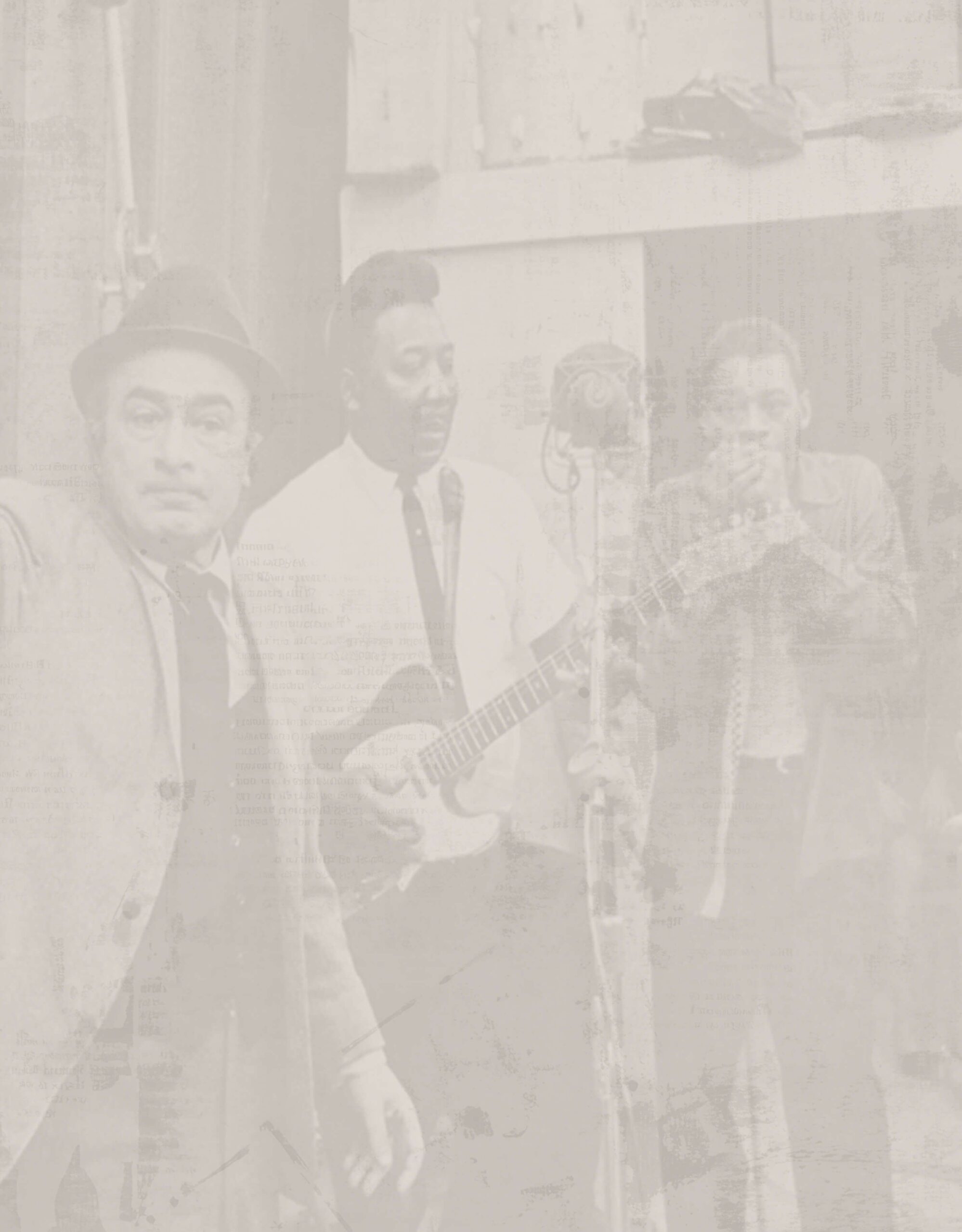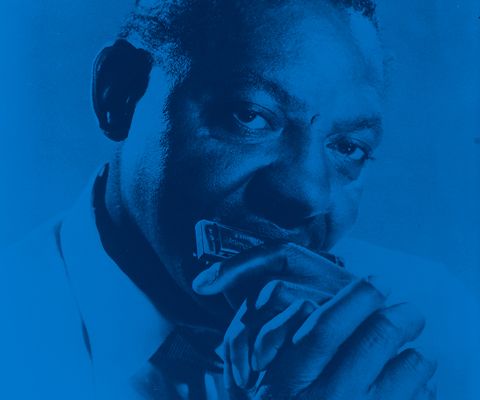Sonny Boy Williamson
Sonny Boy Williamson
“Sonny Boy Williamson was my idol…I got on really well with him, as well as anyone could.” - John Mayall
What’s in a name? The Sonny Boy Williamson who recorded for the Checker Records roster in the ‘50s and ‘60s was an accomplished blues harmonica player - but he was not the first such instrumentalist with that name, a distinction that no doubt confused record buyers and hasty historians for decades. But make no mistake: this Sonny Boy Williamson was a crucial figure in the story of Chess Records.
The confusion over the identically-named bluesmen isn’t helped by the lack of concrete information about Williamson II’s upbringing. Varying records place him as Alex (or Aleck) Miller (née Ford - the latter was his mother’s name and the former his stepfather’s), born in Mississippi somewhere between 1897 and 1912. By the 1930s, he’d started to perform the harmonica in public, rubbing elbows around Mississippi and Arkansas with legendary players from Elmore James to Robert Johnson.
Though he’d regularly performed under the names Rice Miller or Little Boy Blue, a fateful gig in the early ‘40s changed how he’d be known forever. In 1941, Arkansas station KFFA-AM hired Miller as part of a performing ensemble for a new show, King Biscuit Time. (Bandmates included guitarist Robert Lockwood Jr. and pianist Pinetop Perkins.) The station was one of the only in the region who would play music by Black performers, helping the blues spread throughout the Mississippi delta. There was just one catch: Miller was presented as “Sonny Boy Williamson,” which happened to be the name of another blues harp player simultaneously signed to Bluebird Records. (That Williamson died in 1948, two years after Miller left the program, and he’d claim that he got to the name first.)
Sonny Boy Williamson II would go on to host a radio program for a different Arkansas station in 1948, spotlighting friends like Elmore James and Arthur “Big Boy” Crudup. (He’d also have a profound effect on his roommate, Chester Arthur Burnett, who also took up harmonica under the name Howlin’ Wolf.) In 1951, he made his first record, cutting the original song “Eyesight to the Blind” for the Trumpet Records label. Elmore James would also sign to Trumpet, and Williamson’s moaning harp was heard on his powerful rendition of Robert Johnson’s “Dust My Broom.”
In 1955, a bankrupt Trumpet sold Williamson’s contract to Chess Records, who put him to work on the Checker imprint. Moving to Chicago, he reunited with Lockwood Jr., one of the label’s chief session guitarists; Williamson would most famously cut the track “Don’t Start Me Talkin’” for Checker, which became a Top 5 hit on the R&B charts. Though his output was slow, and he was even known to skip town to sit in on radio sessions back home, his distinctive vocals and versatile blowing made him one to watch.
An aging Williamson was one of the breakout stars of the American Folk Blues Festival, which took some of Chess’ biggest blues acts to Europe, where he galvanized a generation of British rock musicians enough to reside in England for a spell - even sporting a bowler hat and custom made suit from a London tailor. Between 1963 and 1965, he’d record sessions with The Yardbirds - the first breakthrough act to feature guitarist Eric Clapton, who’d cover “Eyesight to the Blind” for the film version of The Who’s rock opera Tommy - as well as The Animals and future Yardbirds guitarist Jimmy Page. During this time, he’d score hits with “Help Me” and “Bring It On Home,” the latter of which Page would cover in his new band Led Zeppelin.
In 1965, Williamson moved back to Arkansas, returning to perform on King Biscuit Time. (According to legend, a Canadian group then named The Hawks sought Williamson out for a jam session around this time; they’d later change their name to The Band.) That same year, he died of an apparent heart attack, leaving behind a small but pivotal body of work that gave Chicago blues a power and edge it would have missed without him. Along with his performing namesake, Sonny Boy Williamson II was part of the inaugural class of the Blues Hall of Fame in 1980.
What’s in a name? The Sonny Boy Williamson who recorded for the Checker Records roster in the ‘50s and ‘60s was an accomplished blues harmonica player - but he was not the first such instrumentalist with that name, a distinction that no doubt confused record buyers and hasty historians for decades. But make no mistake: this Sonny Boy Williamson was a crucial figure in the story of Chess Records.
The confusion over the identically-named bluesmen isn’t helped by the lack of concrete information about Williamson II’s upbringing. Varying records place him as Alex (or Aleck) Miller (née Ford - the latter was his mother’s name and the former his stepfather’s), born in Mississippi somewhere between 1897 and 1912. By the 1930s, he’d started to perform the harmonica in public, rubbing elbows around Mississippi and Arkansas with legendary players from Elmore James to Robert Johnson.
Though he’d regularly performed under the names Rice Miller or Little Boy Blue, a fateful gig in the early ‘40s changed how he’d be known forever. In 1941, Arkansas station KFFA-AM hired Miller as part of a performing ensemble for a new show, King Biscuit Time. (Bandmates included guitarist Robert Lockwood Jr. and pianist Pinetop Perkins.) The station was one of the only in the region who would play music by Black performers, helping the blues spread throughout the Mississippi delta. There was just one catch: Miller was presented as “Sonny Boy Williamson,” which happened to be the name of another blues harp player simultaneously signed to Bluebird Records. (That Williamson died in 1948, two years after Miller left the program, and he’d claim that he got to the name first.)
Sonny Boy Williamson II would go on to host a radio program for a different Arkansas station in 1948, spotlighting friends like Elmore James and Arthur “Big Boy” Crudup. (He’d also have a profound effect on his roommate, Chester Arthur Burnett, who also took up harmonica under the name Howlin’ Wolf.) In 1951, he made his first record, cutting the original song “Eyesight to the Blind” for the Trumpet Records label. Elmore James would also sign to Trumpet, and Williamson’s moaning harp was heard on his powerful rendition of Robert Johnson’s “Dust My Broom.”
In 1955, a bankrupt Trumpet sold Williamson’s contract to Chess Records, who put him to work on the Checker imprint. Moving to Chicago, he reunited with Lockwood Jr., one of the label’s chief session guitarists; Williamson would most famously cut the track “Don’t Start Me Talkin’” for Checker, which became a Top 5 hit on the R&B charts. Though his output was slow, and he was even known to skip town to sit in on radio sessions back home, his distinctive vocals and versatile blowing made him one to watch.
An aging Williamson was one of the breakout stars of the American Folk Blues Festival, which took some of Chess’ biggest blues acts to Europe, where he galvanized a generation of British rock musicians enough to reside in England for a spell - even sporting a bowler hat and custom made suit from a London tailor. Between 1963 and 1965, he’d record sessions with The Yardbirds - the first breakthrough act to feature guitarist Eric Clapton, who’d cover “Eyesight to the Blind” for the film version of The Who’s rock opera Tommy - as well as The Animals and future Yardbirds guitarist Jimmy Page. During this time, he’d score hits with “Help Me” and “Bring It On Home,” the latter of which Page would cover in his new band Led Zeppelin.
In 1965, Williamson moved back to Arkansas, returning to perform on King Biscuit Time. (According to legend, a Canadian group then named The Hawks sought Williamson out for a jam session around this time; they’d later change their name to The Band.) That same year, he died of an apparent heart attack, leaving behind a small but pivotal body of work that gave Chicago blues a power and edge it would have missed without him. Along with his performing namesake, Sonny Boy Williamson II was part of the inaugural class of the Blues Hall of Fame in 1980.


